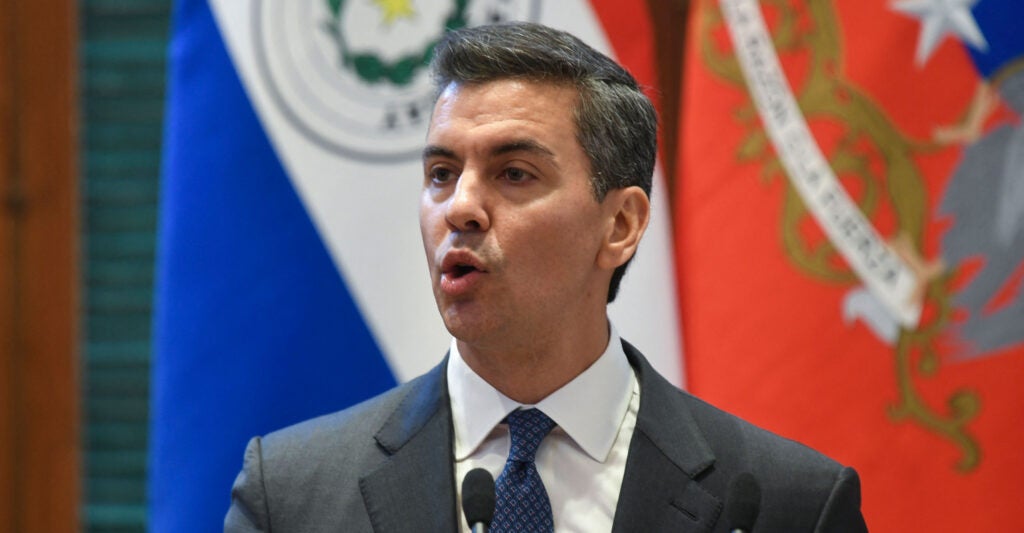Reconfirming that his country would be relocating its embassy in Israel from Tel Aviv to Jerusalem in a July 17 speech, Paraguayan President Santiago Peña underscored that “Paraguay has always been a great friend of Israel, we always say that it fills us with pride to have been the decisive vote for the creation of that State, a fact that has deeply marked our relations.”
He added, “It is hard to believe that two countries so geographically far away can be so close in the hearts of their peoples.”
Washington should make a note of that.
Certainly, from the standpoint of the United States, Paraguay has been playing a notable role on the foreign policy front.
For years, it has maintained constructive relationships with Israel and Taiwan, two important allies of the United States.
In 2019, Paraguay officially recognized the military wings of the Palestinian group Hamas and Lebanon’s Hezbollah as terrorist organizations. Equally noteworthy is that Paraguay is one of just 12 countries in the world—and the only nation in South America—to recognize Taiwan, whose formal diplomatic relationship with Paraguay was established in July 1957.
These facts make Paraguay stand out as a unique partner of the United States, whose bilateral partnership should be further enhanced to grow the practical nexus among these three willing partners of the United States—Israel, Paraguay, and Taiwan.
More specifically regarding Paraguay’s increasingly practical relationship with Taiwan, it’s notable that bilateral trade in the past five years has grown by more than 600%, demonstrating how the two economies work together, complementing each other.
Peña, who has visited Taiwan twice in less than a year, has reiterated to Taiwanese President Lai Ching-te the international support of Paraguay for the Taiwanese, demonstrated in forums such as the U.N. General Assembly, Interpol, and World Health Assembly.
The vibrant Paraguay-Taiwan partnership matters to Washington in constraining China, which has been seeking trade, diplomatic, and military ties in Latin America and the Caribbean for years.
From a broader geostrategic perspective, the overall challenges China poses on various policy fronts are still unnerving for the U.S. and many others, particularly given the fact that it has become unambiguous that China is the most capable adversary the United States is currently facing.
The United States can and must win the geopolitical diplomatic competition with China. There is still time for America to counter China’s malign and manipulative influence with other nations, but that window is quickly closing.
Washington cannot win the battle of ideas and diplomacy without being proactive on this critical front. To that critical end, Washington should pay closer attention to the ongoing interaction and the broad relationship between Paraguay and Taiwan while proactively paving a deeper and wider path of a pragmatic, strategic partnership among the three nations—the U.S., Paraguay, and Taiwan.
Indeed, it’s also encouraging that Paraguay has unambiguously shown itself to be a good partner for the United States in hemispheric relations. The country has worked closely with Washington in counternarcotics initiatives, as well as cooperating to reduce other illicit cross-border activities. Paraguay also has been an essential partner of the U.S. in countering growing malign influence of China in the Americas, which brings increasing instability while threatening U.S. regional partnerships.
In introducing a bipartisan resolution commemorating the 163-year bilateral relationship between Paraguay and the United States and welcoming Peña’s visit to the United States in May this year, Sen. Bill Cassidy, R-La., noted:
Paraguay is an important U.S. partner in the hemisphere. They are a vibrant democracy, an ally against the Venezuelan dictatorship, and the only country in South America that continues to recognize Taiwan. This resolution emphasizes that the United States and Paraguay are allies with common goals so that both countries benefit.
In recent years, Paraguay has implemented a series of significant political and economic reforms. This ongoing transformation has earned the nation plaudits from allies and potential investors alike.
Paraguay has been delivering notable economic growth. Over the past five years, despite the challenging economic environment, its economy has grown at a greater rate than many of its neighbors. The sustained push for economic liberalization and greater transparency in government has been gradually improving Paraguay’s competitive edge.
The Heritage Foundation’s annual Index of Economic Freedom rates Paraguay’s economy as “moderately free,” and the country’s global ranking is ahead of its large neighbors Argentina and Brazil.
Reflecting Paraguay’s economic resilience and sound economic fundamentals, on Friday, Moody’s Ratings elevated Paraguay’s credit assessment to “investment grade” in an unambiguous recognition of the notable emerging market as “one of the fastest growing economies in South America.”
The credit rating agency further noted that “the upgrade of Paraguay’s rating reflects a combination of factors, including robust and sustained economic growth and [the] expectations that the economy has become more resilient to shocks.”
All in all, Paraguay is becoming one of the most reliable partners of the United States. As Peña pointed out during a public event last October at The Heritage Foundation, “Paraguay offers a platform of a stable, democratic, economic environment” for the United States.
More than ever, it’s in the clear interest of Washington and America’s private sector to work closely with Paraguay on a range of vital issues that advance freedom, opportunities, and prosperity for both nations.
